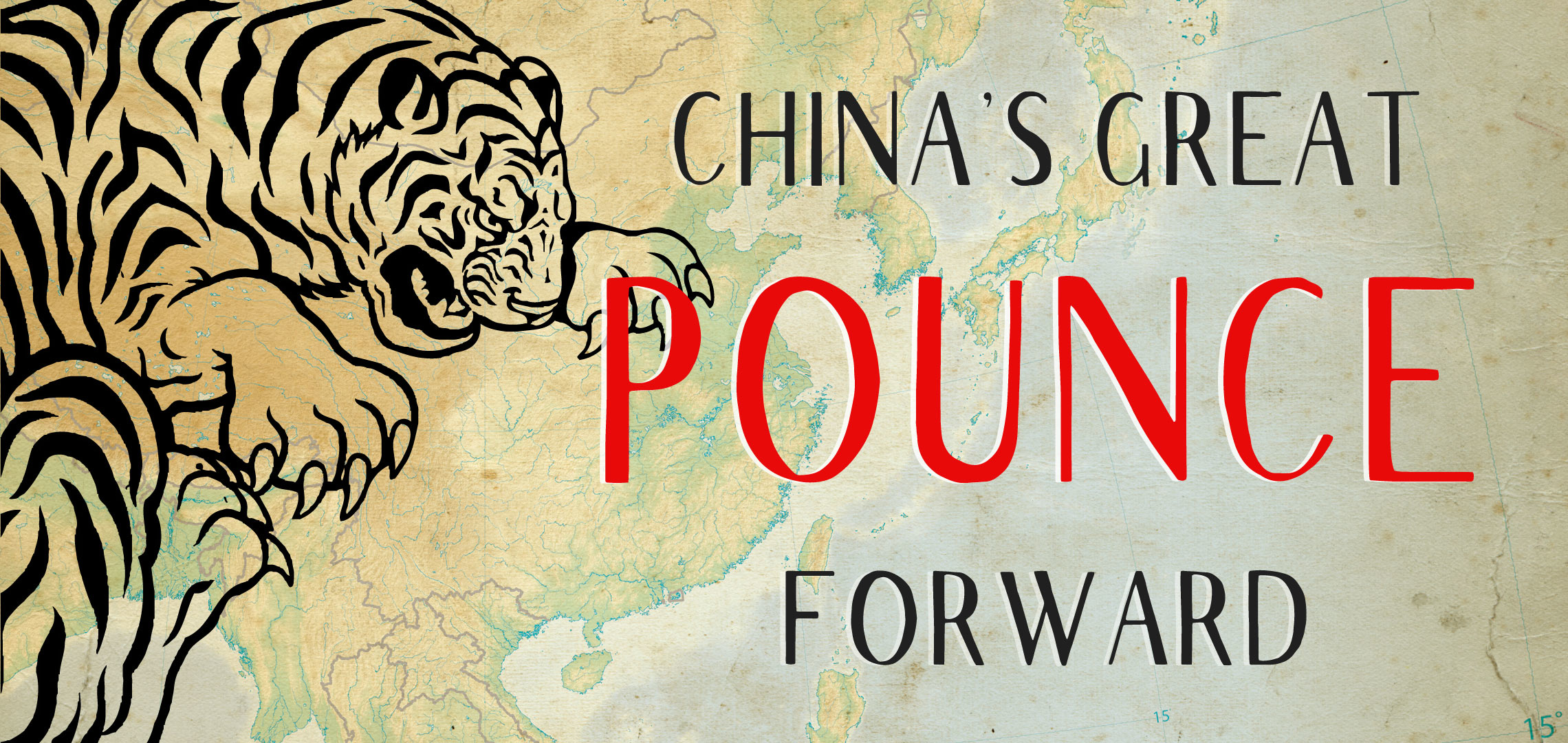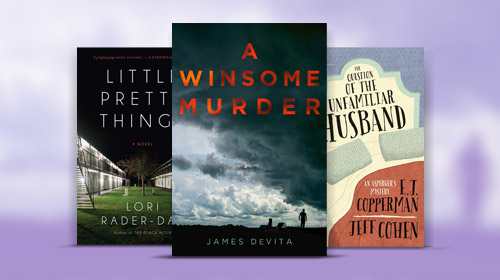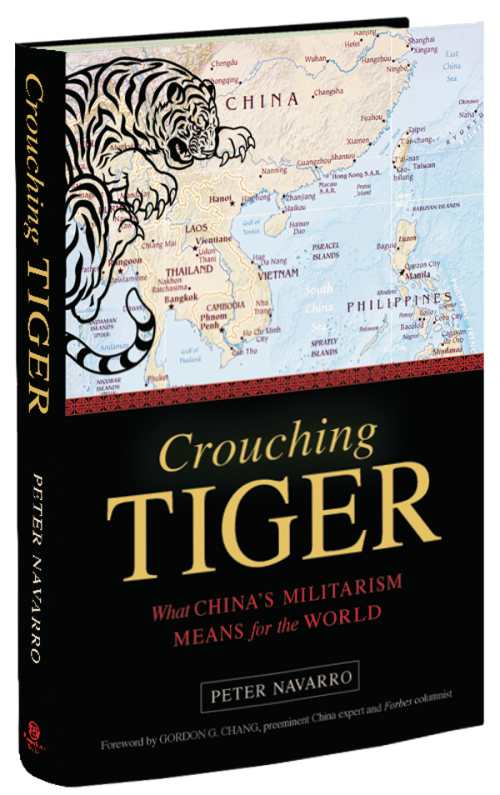China's Great Pounce Forward

China has been a puzzle to the West for centuries and, despite how economically entwined the nation is with the rest of the world in the twenty-first century, Chinese intentions are still a kind of mystery—from the boardroom to the war room. Opinions differ on how the United States should react to provocations by the emerging giant, from the South China Sea to cyberspace. On the side of extreme caution and warning is China expert Peter Navarro, whose new book, Crouching Tiger: What China’s Militarism Means for the World (Prometheus Books), contains scenarios that could make you lose some sleep at night. Below the news, FTW interviews Navarro on his evidence for China’s intentions and what he would do if he were in charge.
First, the News

Our latest issue is available at select Barnes & Noble and Books-A-Million stores December 1.
Winter 2016: On its way to your home, library, or bookstore is our latest issue of Foreword Reviews, and we’re very happy to have librarian/musician/writer Kyrsten Bean rocking our cover. If you haven’t been to your local library lately, you might be surprised at how up-to-date both the librarians and the technology are. Kyrsten is a mild-mannered librarian by day, managing special programs in local schools and reading about quantum physics; by night, she rocks out in a local band. In our Winter 2016 issue, we feature an interview with Kyrsten along with our usual reviews of more than 180 books from independent and university presses. If you haven’t subscribed yet, do it now! (If you’re a librarian, it’s free!)

Millennial Readers: They travel in packs, and they read physical books bought from their local bookstores. Not only that, they hold post-reading discussions as they’re sitting in the coffee shop sipping their lattes. Our senior millennial correspondent (and editorial assistant who is way cooler than all of us) Hannah Hohman reports on the millennial readers’ informal book club.

Super Books: Have you ever wished you could throw on a cape and be gifted with superpowers? Or maybe you already have a cape, and you like to wear it while you read. Yeah, uh, we don’t do that either. That would be weird. Still, here are six indie superhero books.

Top Indie Whodunnits: If you were a detective in a past life, or perhaps an aspiring one now, we’ve got some cases for you to crack. By the time you’re finished, you’ll be a regular Sherlock Holmes. Recommend your favorites to Watson!
Featured Reviews of the Week
All-Day Breakfast by Adam Lewis Schroeder. “These zombies crave bacon, not brains, in a humorous adventure ripe with keen social observations.” Reviewed by Gary Presley.
Zelestina Urza in Outer Space by David Romtvedt. “Romtvedt is an enchanting, natural storyteller, with a light touch and a wry sense of humor.” Reviewed by Kristen Rabe.
Walking in Grace with Grief: Meditations for Healing after Loss by Della Temple. “These powerful meditations provide practical comfort for those dealing with grief.” Reviewed by Bobbye Middendorf.
The Secret Language of Women by Nina Romano. “A stunning look at China at the turn of the twentieth century, this is a love story that crosses boundaries both cultural and geographic.” Reviewed by Vernieda Vergara.
Lotería Huasteca: Woodblock Prints by Alec Dempster. “This is celebration sincere and genuine, an appreciation by an artist whose love for his art and for his subject shines through every print.” Reviewed by Anna Call.
Peter Navarro
The Chinese and the US economies are intricately woven into one another. Doesn’t that make war between us less likely?

Peter Navarro
In the chapter of Crouching Tiger about “pathways to peace” that may not work, I look extensively at the economic engagement argument for peace. Certainly, the interdependence of the US and Chinese economies makes war less likely—but hardly rules it out. Not by a long shot. The poster child for this miscalculation is World War I. Everyone was banking on the integration of the German and British economies to prevent war. It was a bloodbath. As experts like Professor John Mearsheimer and Colonel T.X. Hammes point out in the book, nationalism often trumps economics, so we shouldn’t count on “trade trumps invade” to bring us peace.
There’s already a cyber war raging between the United States and China. Is it a private-sector war or is the Chinese government directly involved in hacking attacks? What are the stakes?
I look extensively at this issue in several chapters of Crouching Tiger and illustrate unequivocally that this is state-sponsored cyber warfare on China’s part on a grand and totally unacceptable scale. The attacks are orchestrated by the People’s Liberation Army.
The targets are two-fold. First, China targets our military to steal our most advanced weapons designs, like the F-35 stealth fighter and Aegis battle management system—linchpins of American national security. China uses this information not just to build cloned weapons to defeat us but to also learn how to defeat America’s weapons during battle.
Second, China targets our businesses and industrial base to grow their economy at the expense of ours. This not only slows America’s growth and puts millions on the unemployment line, it also weakens our ability to manufacture the kind of weapons we need to defend America.
What is the biggest false piece of “conventional wisdom” we have about China?
That China is a “friend” engaged in a “peaceful rise” that will eventually become more democratic as its economy grows and its political system matures. Since 2008, China has done a very good job of overturning this conventional wisdom with its aggression against countries like the Philippines and Vietnam in the South China Sea, against Japan over the Senkaku Islands in the East China Sea, India in Arunachal Pradesh, and the democracy of Taiwan. True wisdom allows us to understand that China is a strategic rival competing for markets and influence in the most vibrant area of the world against the United States and many of its neighbors. It is also an authoritarian and revanchist state that economic development is not likely to democratize and “tame” but rather simply empower.
What made Prometheus Books the right publisher for this work?
I’ve published ten books with some of the top publishers in the world, and I can say that, hands down, Prometheus is the best. It’s production schedule was flawless, it was open to including sophisticated maps and photos in the book, and the cover is gorgeous. I think the fact Prometheus is located away from the “big city” has created a culture within the company of service and foresight. Its partnership on distribution with Random House is a huge plus. Finally, its legacy as a publisher focusing on serious books with broader market appeal is exactly the fit for Crouching Tiger.
Let’s say, by some strange electoral fluke, you take the oath of office as president in January 2017. What’s the first thing you’ll do about China?
The best way to deal with China is to do it through private channels without publicly challenging their government, which causes a “loss of face” and simply provokes reaction. The first thing I’d do is send my secretary of defense and treasury secretary on a secret mission on Air Force One to explain behind closed doors to the Chinese two things.
On the economic front, America will no longer tolerate unfair trade practices like currency manipulation, illegal export subsidies, and intellectual property theft, including cyber attacks. If China fails to unilateral address that, America will take the firm possible steps against these practices.
On the military front, China must know that we are not going to be trading with a country that engages in the kind of aggressive behavior it is doing and that our military will be geared to fighting that aggression and be resolute. We would prefer peace, but if China is aggressive, the cost will come on both the military and economic battlegrounds.
